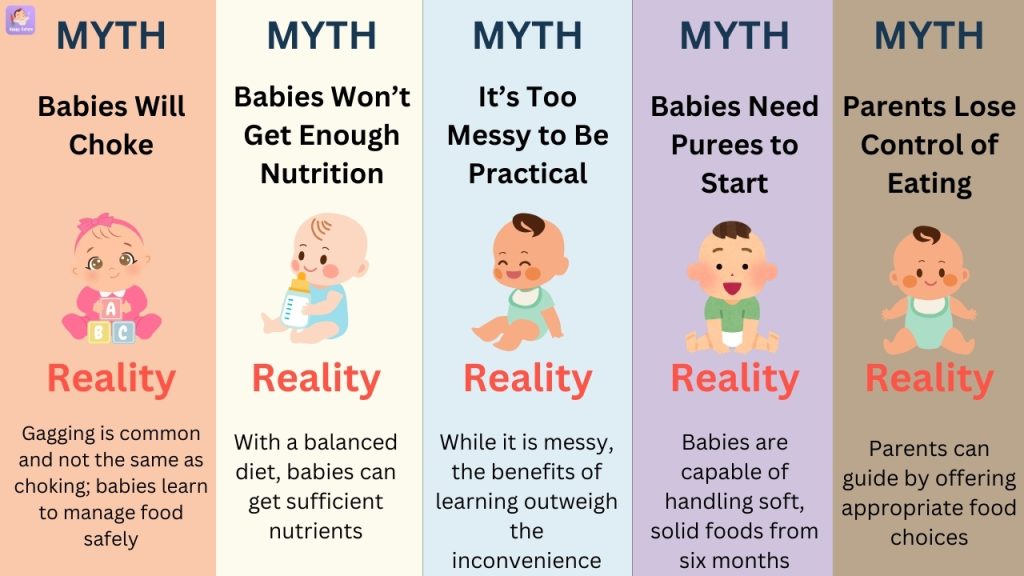Starting baby-led weaning might feel overwhelming at first. But it’s an effective way to introduce your little one to foods from the family pot and help them self-feed. It’s common for parents to find themselves both excited and worried about letting their babies explore foods on their own.
Many families feel uncertain when choosing BLW over traditional spoon-feeding methods. It’s completely normal to have questions and concerns about this new and unique approach to feeding your baby. This shift in control might feel strange at first, but it helps build healthy eating habits in your baby from the start.
Read this blog to know about the common doubts and how parents can safely start BLW with their little ones!
Common Reasons Parents Doubt Themselves During BLW
1. Fear of Choking Leads to Stress
It’s natural for every parent to feel nervous when their baby starts eating solid foods. Those first few bites might have you sitting on the edge. The fear of choking feels very real and completely normal.
Understanding the difference between gagging and choking will help calm your nerves. So will the information that you will get from this blog. The first step to BLW is educating yourselves as parents on ins and outs of BLW.
Babies have a gag reflex that helps them avoid choking on food. As a result, they naturally gag while learning how to move and handle food in their mouths and down their throats. As opposed to the common belief that gagging means choking, gagging actually prevents choking.
Your baby’s gag reflex sits further forward in their mouth than adults. This thing helps them learn to eat solid foods safely. When your baby gags, don’t panic. Attend to your baby calmly and shush them if needed. Pro tip : nicely hand mash any and every food that you offer your baby. For instance, handmash khichdi, porridges, rice preparations, rotis, parathas, cheelas, dosas, sabjis, etc. before offering it to your baby.
2. Nutritional Concerns Make You Question the Process
Parents often worry whether their baby eats enough food each day and whether or not their nutritional requirements are getting fulfilled.
– First and foremost, your baby’s major source of nutrition should be breastmilk until 12 months of age, according to WHO.
– The foods that you’re offering your baby will help them get acquainted with different foods, flavours and textures. The nutrients that they are getting by taking these foods are just an added benefit. The famous saying “food before one is just for fun” can be hard to believe. Many parents spend time counting every bite their baby takes.
Also Read This :- Handling Baby Mealtime Struggles
– Getting your baby to try different foods can feel like a big challenge. Some days your little one might love carrots but completely ignore dal. These changing food preferences can make you wonder about proper nutrition.
– Looking at portion sizes can become an endless puzzle for parents. Your baby might eat a lot one day and barely touch food the next. Other parents might share stories about how much their babies eat. These comparisons can make you question if you’re doing things right.
– Remember that breast milk is still the main source of nutrition. Your baby is naturally good at knowing how much food they need. Trust that your baby will develop healthy eating habits with time and patience.
3. Pressure from Others Causes Doubt
Every baby learns to eat solid foods in their own way. Some babies dive right in and grab everything they can reach. Others take their time and prefer to watch food from afar. Parents often forget that each child follows their eating timeline.
Seeing other babies eat better or faster can make you feel worried. Your friend’s baby might be eating whole sandwiches while yours just pokes at food. Social media shows babies eating perfectly, which doesn’t help your confidence. Remember that these snapshots don’t show the whole feeding journey.
Your baby’s eating skills often improve in sudden jumps rather than slowly. They might play with food for weeks and then suddenly start eating well. These bursts of progress can come when you least expect them.
4. Lack of Immediate Results Can Be Discouraging
Every parent naturally wants to see their baby eating well right away. The slow start with baby-led weaning might make you question your choices. Those first weeks often bring more playing with food than actual eating.
Parents often worry whether their baby gets enough food each day. Counting every bite becomes a daily habit for many. This should be avoided at all costs. The mess on the floor might seem bigger than what went into their mouth.
Every child develops eating skills at their own natural pace. Some babies take longer to feel comfortable with solid foods. Your consistent patience and support help build good eating habits over time.

Also Read This :- Managing Mess in BLW: A Step-by-Step Guide
How To Start Your BLW Properly?
Your baby needs to be truly ready before starting solid foods. Looking for clear signs will help you know when to begin this exciting journey. Most babies show readiness around six months of age when they can sit well.
Getting started with BLW needs some careful planning and preparation. You choose foods that are soft enough to squish between your fingers easily. You can also steam vegetables until they’re quite tender but not mushy or falling apart. Cut fruits and vegetables into sizes your baby can grasp with their tiny hands. Never force food into their mouth or rush them to eat more quickly.
Creating a peaceful mealtime helps your baby focus on learning about food. Here’s how:
- Turn off the TV and put phones away during family mealtimes.
- Make sure your baby sits safely in their high chair without any distractions.
- Join them at the table and eat together as a family whenever possible.
First Foods to Try:
- Steamed carrot sticks
- Banana pieces
- Steamed apple strips
- Ripe mango slices
- Softly cooked pumpkin pieces
- Sweet potato wedges
Remember, every baby learns differently, and that’s perfectly fine. Your confidence will grow as you watch your baby develop their eating skills.
Baby-led weaning can cause stress to new parents. Having moments of doubt doesn’t mean you’re doing anything wrong. It simply shows how much you care about your baby’s well-being.
The feelings of uncertainty usually fade as you watch your little one become more confident with food. Soon enough, you’ll look back and realise how far both you and your baby have come on this feeding journey together.
What is your experience with BLW? Which finger foods did your baby try first?
Download the App Now :- Happy Eaters




